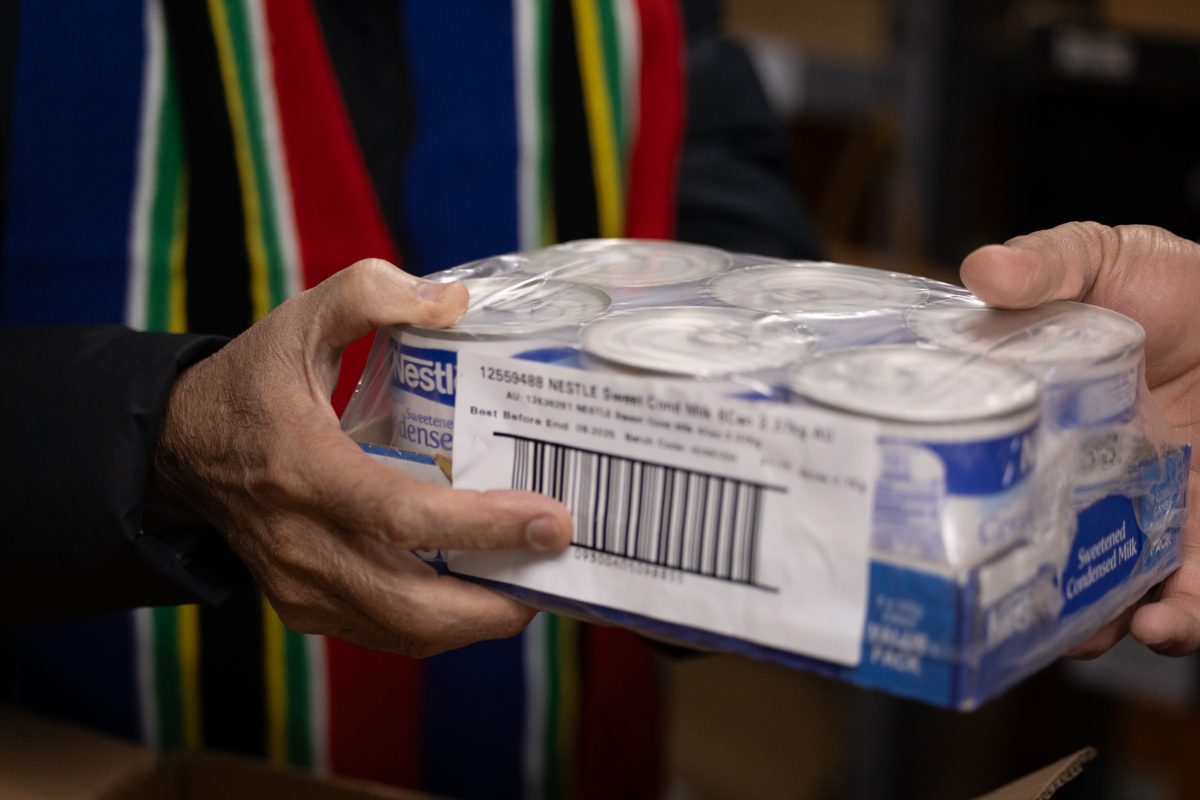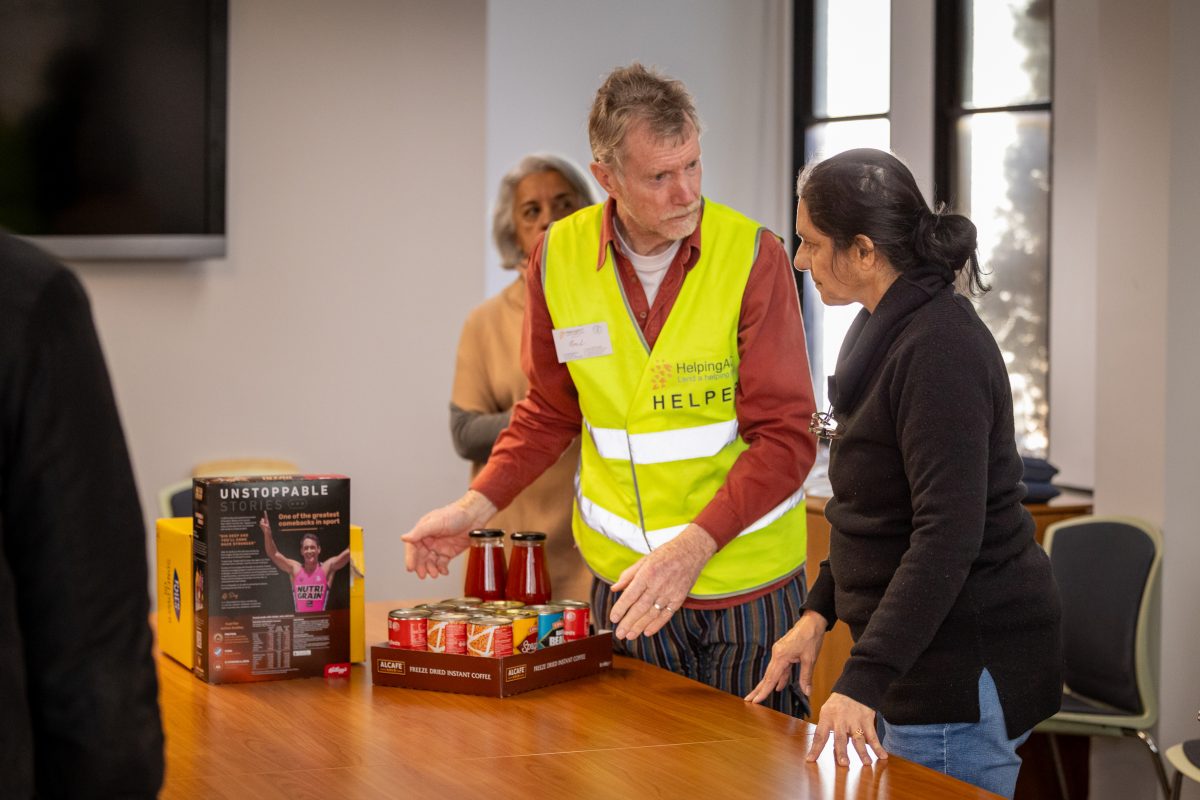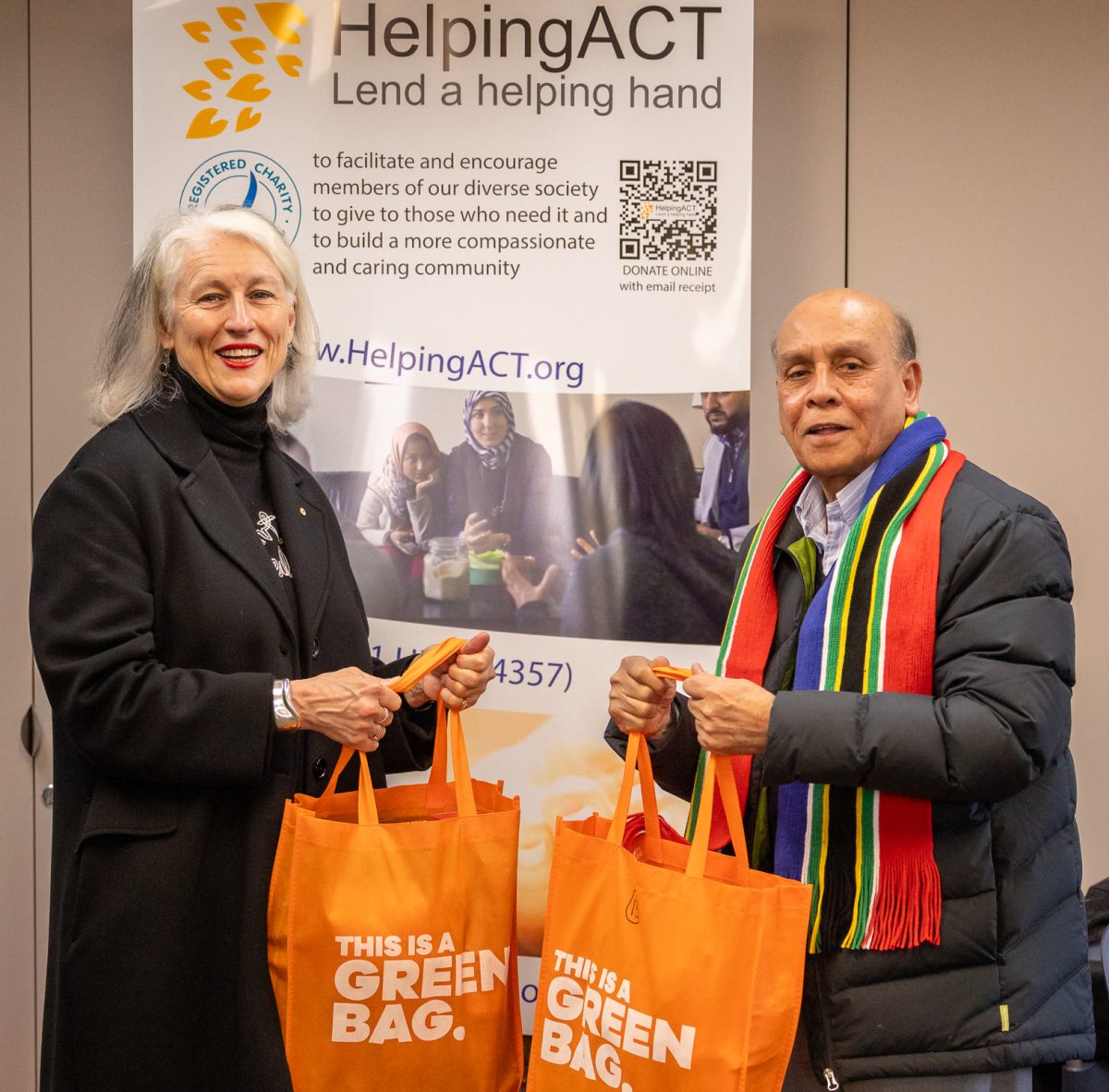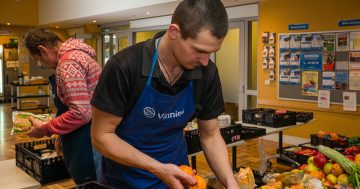
Longlife foods are part of the food packages provided by HelpingACT. Photo: Emmanuel Rodriguez.
“Desperate would be the word, desperate,” says Kirstie Baker.
She’s talking about the need for food relief in Canberra, where the soaring cost of living and a cold, cold winter are hurting the 40,000 people who live below the poverty line in Canberra*.
Kirstie runs Tuckerbox at Hackett. It’s a co-op run by Holy Cross Anglican parish. Food and grocery items purchased by members are mostly provided by Foodbank NSW/ACT and OzHarvest.
Canberra’s food pantries, HelpingACT, OzHarvest and Second Bite were among the stakeholders who worked with Hands Across Canberra on a food relief plan for Canberra last year, looking to strengthen cooperation in a sector experiencing distressing levels of demand.
Volunteering ACT supports organisations through the Canberra Food Relief Network and says last year, 12,500 Canberrans ran out of food entirely, and 52 per cent of people experiencing food stress are employed.
Tuckerbox helps 100 households every Saturday afternoon by providing low-cost or free groceries, afternoon tea and a listening ear.
Their eldest community member is 96. Others have chronic conditions like multiple sclerosis or mental health issues that prevent them from working and are surviving on a meagre disability allowance. Some retirees are asset-rich but cash-poor, having retired 20 years ago on what seemed like enough income.
“We have single person households and a family of 10, it’s a multicultural, multilingual, multi-demographic community”, Kirstie says.
“One lady was a relatively senior public servant when her husband departed, leaving her with a million dollars worth of debt and two special needs children.
“Some weeks, she’d have $5 to $10 left for food after meeting all her bills. She says we saved her life.”
It’s the reality of food relief in Canberra, where people working full-time in one or more jobs can struggle to put food on the table.

Helping ACT volunteers operate three food banks. Photo: Emmanuel Rodriguez.
At HelpingACT, Mohammed Ali and his volunteers pack dozens of food parcels every week for their food banks in Civic, Wright and Franklin. The organisation also regularly caters for 50 to 80 homeless people at the Early Morning Centre and Kippax Uniting Care.
Six Canberra schools, mostly on the south side, are feeding up to 300 students every week in HelpingACT’s school breakfast program, and there’s constant demand from primary school children who are coming to school hungry.
“This is actually one of the things where your heart bleeds,” Mohammed says. “We are an affluent city. There should be nobody struggling for the most basic needs of life, for food, let alone children.”
Kirstie Baker makes the point that nutritious food is needed – one of the first things to disappear from family meals is fruit and vegetables.
“You get people relying on cheap carbs, beginning to seriously lack nutrition and in the end damaging their health and having impacts on mental wellbeing too,” she says.
“My dream would be to have enough money to provide fresh fruit and vegetables for everyone in need.”
The Canberra Food Relief Community identified multiple needs: shared access and storage facilities, accessible educational resources for people in need, transport and delivery facilitation, and regular secure funding for distribution activities.
There’s already informal collaboration: charities supplying food during the week drop off perishables to Tuckerbox for the weekend. Kirstie orders supplies through Food Bank for Mohammed Ali to top up his supplies.
But plenty more is needed – online training in food handling, for example, and centralised information about food relief would help. Wellbeing support matters for street pantries in particular, often run by good-hearted people who carry an increasing burden.
And there’s no doubt the need is growing. Kirstie says there’s been a 50 per cent rise in the amount of food sourced by individual families who are increasingly relying on Tuckerbox rather than supermarkets as the financial squeeze gets tighter.
She’d love community gardens and home vegetable growers to donate their excess, noting the low-cost/no-cost co-operative model also provides consumers with dignity and community.
“I like to say we’re the fence at the top of the cliff, not the ambulance at the bottom,” she explains. $52,000 funding per annum would meet fresh fruit and vegetable costs for Tuckerbox.

Hands Across Canberra CEO Genevieve Jacobs and helpingACT’s Mohammed Ali. Photo: Emmanuel Rodriguez
Mohammed Ali is looking for 4000 families to donate just $10 per week to provide a food relief safety net for the families he helps.
“Canberra does not need a situation where food shortages exist. We can do it together,” he says.
*International standards define poverty as half the median household income. In Australia, this is $489 per week for a single adult and $1027 per week for a couple with two children. Canberra figures derived from ACTCOSS analysis.
Genevieve Jacobs is the CEO of Hands Across Canberra. Donate directly to charities or Hands Across Canberra through the HAC portal.
















